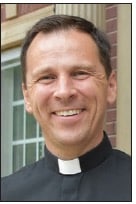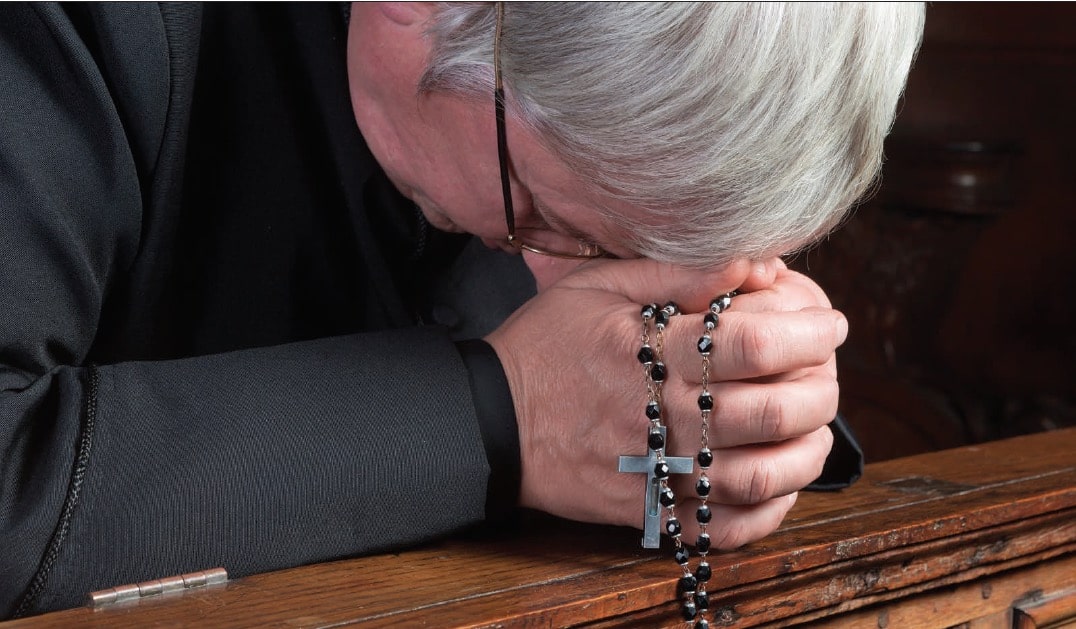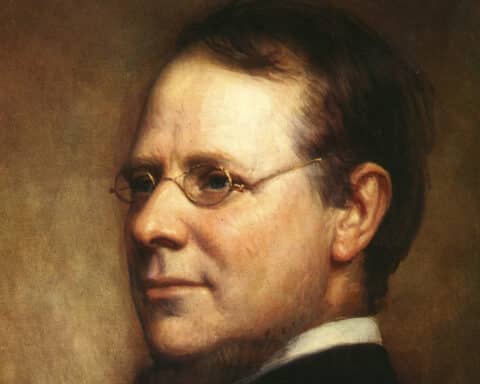It’s a truth universally acknowledged that Jesus, during his public ministry, took time alone to reflect and pray.
The Gospels say he climbed up mountainsides and rowed away from the shore in boats to escape the crowds, going off alone or with select disciples. The very night before he died, he went alone to the Garden of Gethsemane to pray.
Why, then, is it so hard for people in ministry to follow his example and take the time they need to nourish their own relationships with the Lord, and to nourish their own bodies and souls at the same time?
“It is easy for priests or religious and lay ministers to fall into the belief that it is selfish to take the time to take care of oneself,” said Julia Marie Hogan, a licensed clinical professional counselor and author of “It’s OK to Start With You” (OSV, $14.95). “Or, they may feel guilty for spending time away from their ministry work. ‘Why use my precious time to take care of myself when I could be serving others?’ they ask. ‘Isn’t self-care just being selfish?’ Not at all,” she said.
Hogan added: “Not only is self-care necessary for serving others in the most effective and authentic way possible, it is also honoring your inherent, God-given dignity as a person created and loved by God. Caring for yourself is a way of honoring the fact that you are loved by God just as much as he loves the people you are caring for.”
Self poured out
Father Brian Welter, dean of formation at the University of St. Mary of the Lake/Mundelein Seminary, said that the need to care for oneself applies to ministers just as it does to every baptized person.
“Any person who wants to serve God, wants to serve their community, is the steward of their own life,” Father Welter said.
But ministers and other people in service fields, like doctors and nurses or therapists, have a special need to care for themselves, Hogan said.

“Individuals who work in ministry or other service fields are often at risk for what’s called ‘compassion fatigue,’ which is becoming burnt out from [the] difficult work of ministry,” Hogan said in an email interview. “The pressure (whether internal or external) to serve as many people as possible often drives individuals to put their own needs and well-being aside in order to spend as much time as possible serving others. Unfortunately, neglecting their own self-care can lead to compassion fatigue. And individuals who experience compassion fatigue often become overwhelmed by their work and have to take a long-term break from their ministry in order to recover.”
That’s burnout, said Timone Davis, assistant professor of pastoral theology at Loyola University Chicago’s Institute of Pastoral Studies. A talk she has given, called “Boundaries, Balance and Burnout in Ministry,” addressed issues similar to those raised in Hogan’s book.
| Take Spiritual Stock |
|---|
|
Start by trying to sit in silence for five minutes a day, just sitting and being open. After the five minutes have passed, jot down what comes to mind in a notebook, in a notes app on your phone, anywhere. Use words, or use drawings if you prefer. Then, spend a last five minutes thinking about what happened that day, or, if you do it in the morning, the day before.
|
Point of burnout
But burnout can mean two different things, Davis said. As one word — burnout, a noun — it means hitting a wall and having to stop, she said. “I would define it as when things must come to an end.”
As two words — burn out, a verb — it means choosing things get rid of, removing things that are either causing problems or simply adding nothing to your life.

“I like to think of it like metal being refined in fire,” Davis said. “It’s a purification.”
But even burnout as a forced end to one phase leads to new beginnings, she added.
“Burnout allows us to open up to the possibilities that God has for us,” she said. “You have a choice: You can either burn out the things that you need to get out of your life, or God will put this brick wall of burnout in front of you.”
To avoid getting to that point, Davis encourages people in ministry to set firm boundaries and look for ways to achieve balance in their lives.
“In ministry, we don’t have very good understanding of boundaries,” she said. “Our understanding of boundaries doesn’t seem to lend itself to being of service. But boundaries help both the ministers and the people we are serving.”
Having healthy boundaries means setting limits.
“It’s saying, ‘I can do this, but I can’t do that,’ or ‘I’m available Monday, Wednesday and Friday, but not Tuesday and Thursday,” she said. “We need to be doing our meditation. We need to be taking time for our own prayer.”
Too often, Davis said, people in ministry are unwilling to take time even for their own spiritual lives, especially if it means saying no to someone else.
“We say, ‘I don’t have time for meditation, I don’t have time for my own prayer life, I don’t have time to go on a retreat,'” she said. “But these are the things that help us resettle and clarify what we are doing. We end up giving the people we minister to the toxicity that has built up in our own lives.”
Finding nourishment
In a similar way, Davis said, everyone, including people in ministry, can nourish their spirit by allowing their minds simply to rest, even for a few minutes at a time.
“Traditionally, society has said, ‘You can’t do that. You’re wasting time,'” she said. “‘What are you doing looking out the window? You don’t have time for that!'”

Father Welter said he advises seminarians to make a habit of taking breaks and getting proper nutrition and exercise. He also advises them to pay attention to what they do with their leisure time.
“Are they doing things that leave them rejuvenated or exhausted?” he asked.
Most important, he said, is a commitment to prayer.
“Speak to Jesus as Jesus spoke to the Father,” Father Welter said. “Share the contents of your heart with him. Remember that Jesus is attracted to us. He himself is going to the places where we are exhausted, wounded, hurting, and healing us.”
Each seminarian also has a spiritual adviser to help him stay on track in his prayer life, he said (see sidebar).
Sustained by prayer
“As Benedict XVI noted, clergy cannot always give, they must also receive,” said Deacon James Keating, director of theological formation at the Institute for Priestly Life at Creighton University. “Most especially, we must receive love from the Spirit in prayer, but we also need to receive love and affirmation from the people we serve. In their love, too, not simply in prayer, God is laboring to love us. The spiritual life is all about remaining with the Trinity to receive his love, so that we might circulate it to others. In so doing, we come to possess an identity anchored in holy communion. Flowing from this communion is our personal strength to give to those in need, as is the wisdom to know what to give.”
Benedictine Brother Maurus Zoeller of St. Meinrad Archabbey in Indiana said that dozens of priests and deacons and their wives take advantage of twice-a-year five-day retreats geared just to them.
“They can’t just work and work and work,” he said. “They need time for renewal.”
Those who choose to make retreats at the abbey find that renewal in the retreat program, of course, but also in the company of other priests and deacons, in sharing the Benedictine monks’ communal prayer and liturgies and in the peaceful environment of the abbey.
Solitude
Many people find new insights when they make time for solitude, Father Welter said, whether that means going on retreat (see story on Page 6) or just going for a walk alone.
| ‘It’s Ok to Start With You |
|---|
 Author: Julia Marie Hogan Author: Julia Marie Hogan
Publisher: Our Sunday Visitor
Price: $14.95
About: Licensed clinical professional counselor Julia Marie Hogan shows readers the life-changing power of practicing kindness toward yourself, drawing on Catholic teaching, writings of the saints and the latest social science research.
|
That’s why it’s important to follow the example of Jesus and draw away for prayer — although, he acknowledged, it didn’t always work out for Jesus and his disciples, as the crowds followed them.
It’s often when people allow themselves to step back from their daily obligations that they can hear what God is saying to them.
“Something new is stirred up inside the person,” he said.
As an example of Jesus spending time on his own, Davis pointed not to one of the times he withdrew to pray, but to the story of the woman at the well. Most people use that story, recounted in Chapter 4 of the Gospel of John, to elaborate on the meaning of the “water of life” or to note that Jesus reached out to the marginalized, even a Samaritan woman who chose to come to the well at midday, when she would not encounter her neighbors.
But the only reason any of that could happen was, as the Gospel says, because “Jesus, tired from his journey, sat down there at the well” (Jn 4:6).
“Jesus was sitting, chilling, waiting, resting,” Davis said. “The disciples were off finding something to eat, and he was taking time for himself. The thing is, sometimes, in our rest, we discover or make room for someone else’s growth or conversion. We need to cultivate this type of atmosphere in and through our ministry. It only makes sense that we need time for restoration in everything we are doing.”
Companionship
People in ministry must balance solitude with the companionship of friends and loved ones. Father Welter said he makes a point of getting together with a friend who is a Catholic businessman every couple of months. The man is not in Father Welter’s usual circle of ministry, he said, and he can offer a fresh perspective.
Rebecca Frech, author of “Can We Be Friends?” (OSV, $16.95), said most adults have a hard time finding and making friends, but it’s important for everybody.
| Spiritual Direction |
|---|
|
Spiritual advisers help ministers be attentive to their relationship with God, explained Deacon James Keating, director of theological formation at the Institute for Priestly Life at Creighton University. “Primarily the spiritual director is there to gently encourage the cleric to receive what God is doing in his own heart,” Deacon Keating said. “In prayer we are always led to receive the consolation of God’s love and resist any lies or desolations that undermine our faith, hope or love. Consolation is not a ‘happy mood,’ it is adherence to the indwelling Spirit which leads to a deep faith, hope and love, making it easier to do God’s will. Desolation is a prison of isolation, which leads away from God and makes it more difficult to do his will. The director assists the priest in listening to the contents of his own heart, distinguishing between what isolates him from God and what leads him to receive an abundance of his love.” Not all priests have spiritual directors, and not all people who have spiritual advisers are priests, but Deacon Keating said he thinks priests especially benefit from the effort of seeking out direction. “There are few things more important to ‘successful’ ministry than remaining in spiritual direction and committing oneself to the prayer that is direction’s purpose,” he said. “We are so weak as persons that without direction, and support from fellow ministers who can hold us accountable, our prayer lives wither. This withering occurs because prayer is normally private, whereas ministry is public. If the pressure and commitments of ministry overwhelm us, it is very easy to let go of what no one sees — prayer — and choose what others count on us for in public ministry. The irony is, however, that we only fully benefit from clergy in ministry if we can count on them to pray in private.” But clergy and other ministers also are spiritually nourished by those to whom they minister, Deacon Keating said. “In order not to become isolated, ask others whom you know to be in spiritual direction how they found their director. If you cannot find a qualified director immediately, it can help to share faith with a fellow cleric, join a priestly or diaconal fraternity group, converse with a friend who you know to be filled with prayer. Contact your diocese to see if they have a list of available directors, or communicate with a retreat house or local religious order; often spiritual directors are available there. If there is a university that trains directors, contact that program for a list of their graduates who may be local. “ |
“It’s not that people in ministry need that especially,” Frech said. “It’s that they need it too. It’s that they spend so much time ministering to other people, ministering to the relationships of other people, that they forget to attend to their own relationships.”
She said that ministers should remember that God called them personally, as individuals, to bring their specific gifts to ministry, so they need to hold on to their identities to give their best to God and his people.
“You still need to do whatever it is that brings you joy, that challenges you to grow as a person,” she said. “That’s the reason you have friends and family relationships. The people you love — the people who love you — are going to force you to be you.”
Attention to need
Frech likened the difficulty people in ministry have making their needs a priority to mothers she knows who tie themselves in knots making sure their children can get to every ballet lesson or tae kwon do practice, but can’t commit to a twice-a-week workout for themselves.
“They are very bad at telling people what their own needs are,” she said.But when they don’t, they only hurt themselves and the people they are trying to help.
She gave an example of a pastor who occasionally had very painful gout flare-ups, but did not tell anyone he had the condition. Instead, he would quietly arrange for another priest to cover his Masses when he was in too much pain to walk.
| Self-Care Tips for Ministers |
|---|
|
– Have a source of emotional support.
– Set emotional boundaries so that you do not become overwhelmed by the problems of others. Get enough sleep (7-8 hours each night), eat nutritious meals (and don’t skip any) and make time for leisure activities.
– If you’re doing a lot of intellectual work like writing or sending emails, you can push through right up until you go to bed. It helps to set a firm stop time when you put the work away.
– Use social media with a purpose, or not at all.
|
Since he didn’t tell anyone, his parishioners thought he just didn’t care to celebrate with them, Frech said.
It’s a familiar tale to Hogan.
“When you aren’t taking time to eat properly, get enough sleep, cultivate friendships and nurture your own spiritual life, it’s harder to give authentically to others because you aren’t at your best,” Hogan said. “You’re essentially running on fumes, and you can only do that for so long before you run out of physical and emotional energy. On the other hand, when you take care of your own needs, you are able to more authentically serve others because your tank is full. You have the mental and physical energy to serve others because you’ve taken the time to take care of yourself. Additionally, taking care of your own needs sets an example for those that you serve and demonstrates to others that we are all worth taking care of. It’s a way of practicing what you preach.”
Michelle Martin writes from Illinois.





